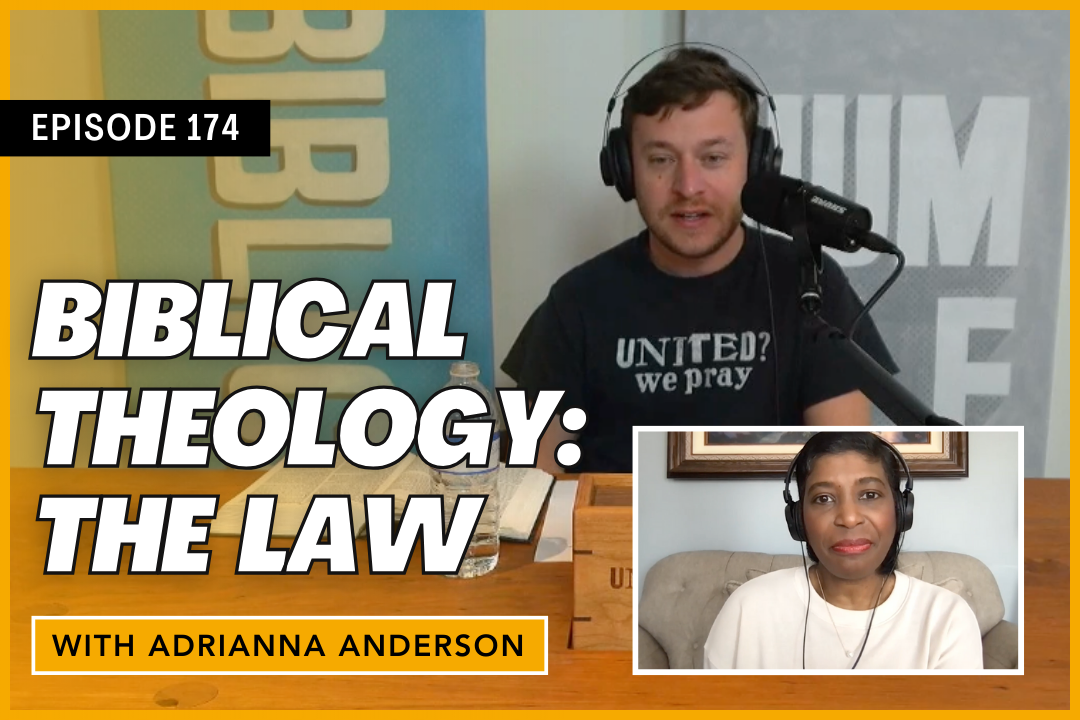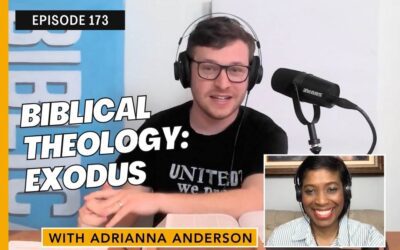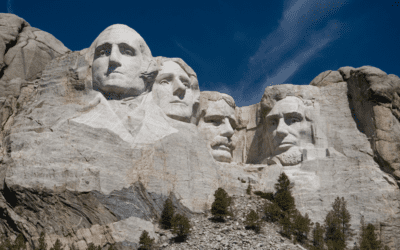Adrianna Anderson is back with us to discuss the law: Leviticus, Numbers, and Deuteronomy- the theology of race. We take a high-level view of these books and see the many lessons God has for His people in dealing with the nations. From this, we are able to start building a Biblical theology of race and ethnicity as we see God’s heart for the nations present from the beginning of Scripture. We hope this series encourages you in your reading of Scripture!
Episode Caption
Austin (00:03.61) You good to go? Grace and peace, friends. Welcome back to United We Pray. Austin Souter joined again by Adriana Anderson for another round of Bible study. How you feeling, sister? Doing well. I’m excited and a little bit daunted by today’s plan, which I think we’ve said every time we’ve done this. But there’s just so much in God’s Word, and there’s so much relevant to this ministry about ethnicity and the way that different peoples interact and the commands God gives them at different points in time. So our plan for today, listeners, is that we are going to be looking at the books of Leviticus, Numbers, and Deuteronomy in one episode. Austin (00:46.102) because we are. And what we’re going to be doing is we’re going to be looking at the different categories theologically that these books give us and we’re going to be looking at specifically zooming in on instances of God talking to his people about the nations or about the ways different peoples from different nations interact and are provided for by the law of God. So I’m excited. How you feeling? Yeah. Alright so let’s start. in Leviticus and just set the context for us. What is the context for the people of God? Where are they? What have they been up to? What have they seen when we start the book of Leviticus? Adrianna Anderson (01:25.518) So, you know, as we start the book, we see that Israel is led by Moses and they’re at the foot of Mount Sinai. God has given them instructions or given instructions specifically to Moses to give instructions to the Levitical priests and Israel concerning sacrifices and worship. So that’s kind of where the book opens. And you’ll see that in mainly chapters one through seven. Austin (01:52.46) So this is the people who started life in Egypt, and God brought them out of Egypt through the Red Sea, defeats Pharaoh and his armies, and here they are receiving God’s law and hoping to enter the promised land. So this book, begins with instructions on different kinds of offerings in chapters one through seven. And the level of detail here, God is just so specific in how he wants his people to approach him. But what we’re learning about, as much as we’re learning about the offerings, we’re learning about sin in these chapters, right? What do we learn about sin from the opening of Leviticus? Adrianna Anderson (02:37.206) So, you know, in the first seven chapters, you’re seeing basically, just as you said, specific laws regarding offerings. And there’s five major offerings that are presented. You’ve got burn offerings, grain offerings, peace and fellowship. And then I would kind of categorize it purification, sin, and then reparation and guilt. And so when you think about just sin, when you think about including like unintentional sin, communal sins, and then leaders being held to a higher standard. You know, there’s some very specific guidelines laid out, primarily in Leviticus chapter 4. And so when you think about sin, that would be what we would consider missing the mark. It’s where an immoral act. considered to be a transgression against divine law is committed. Then when you think about unintentional sin, although there were distinctions between sin and unintentional sin, meaning committed by accident, God did allow sacrifices and offerings to be made. But this does not mean that all have not sinned as we read in Romans 3.23. Then you have a component, hmm? Austin (03:52.848) What’s, I think… Go ahead, go ahead. Adrianna Anderson (03:57.246) Then I was just going to say you have what’s called communal sin and you see that in Leviticus 413 where the whole congregation sinned and the priest had to make a sacrifice or sin offering on their behalf. And then as you kind of skip further into the book, even though it mentions it later, it does touch on it here that leaders are held to a higher standard, specifically the holiness of priests because priests were God’s representative and held high standards for them, just as he does for leaders today. And they were judged more strictly, just as those of us today that are in leadership will be judged more strictly. Austin (04:37.708) And going along with this idea of sin, and I appreciate all the categories you just laid out for us, because I think what’s clear from the Bible is that God’s definition and understanding of sin is much bigger than ours. We shrink sin down to just thinking about this much of what God’s word seems to define as sin. And as we’re thinking about, I’ll just throw this in here, as we’re thinking about the Torah, and what of it applies, and what does not, we know from the New Testament wrong for us to try and add to the completed sacrifice of Christ. So we’re not called to make these offerings anymore, but that doesn’t mean the categories of sin that required them have gone away either, right? Austin (05:23.652) So let’s talk about another theme of Leviticus, which is clean versus unclean. And there’s a lot in here about sort of purity from the nations and why that was important. Can you talk about that and sort of what that is and isn’t? Adrianna Anderson (05:41.326) Sure, so when you think about categories of clean and unclean, I really like to understand kind of what that means and what it looks like. So when you think about the word clean and with its related terms, it occurs about 74 times in Leviticus. That’s a lot. And then when you think about the term unclean and its cognates, it occurs about 132 times in the Old Testament, with 50% of the references being in the book of Leviticus. But purity from the nations was not ethnically based on clean and unclean in Leviticus 11. Specifically, Leviticus 11 denotes dietary laws that were given by God to the nation of Israel regarding the eating of animals that were declared by God as clean and unclean. And these laws were given to protect them from sickness and disease. And so it had nothing to do with ethnicity. and being clean or unclean based on your race. But there were different laws given that they could eat whatever, choose the cud, and specifically whatever parts the hoof. So God gave specific instructions on things that they could eat, but it was for dietary laws and reasons and nothing to do with race. Austin (07:03.416) And something we’re going to see coming up again as we see this lived out in numbers is that God makes provision in his law for the peoples, the nations to join Israel in worshipping Yahweh. And he even, he expects it. And he… gives really dire warnings for his people if they deal inhospitably with the foreigners who are sojourning in Israel. So there’s this dual dynamic going on of God telling them he’s going to give them the land, that they are to clear the land of these pagan nations, but for all who want to worship God, there are open arms. Do I have that right? Austin (07:47.62) So going just really fast, you’ve got the priesthood established in chapters 8 and 9. Then you’ve got the priesthood in action early on in chapter 10 with Nadab and Abiyu. I mean, that, for those who may not be familiar with the story, what happened there? Adrianna Anderson (08:06.414) So, wow. These are Aaron’s sons, and they basically end up disobeying the command of the Lord, and they offer what’s called strange fire before the Lord. And basically what that meant is, they made this offering that God didn’t even instruct them to do, and because of their disobedience, God ends up killing them. But God requires that the standard of worship is the same for everyone, including Israel and all the nations. Yeah, this is one of those, oh my goodness stories, Austin (08:38.232) Yeah, and it’s, I think, appropriately sobering and even, I mean, it’s tragic. And you read about the reaction of Aaron to the loss of his sons and him just being quiet before the Lord, like not blaming God, not fussing at God. It’s just, there’s a whole lot in there. But I appreciate you highlighting just that God… takes his holiness seriously, takes idolatry seriously, whether that happens in the nation of Israel or with the surrounding nations. But he makes a way for all peoples to worship him. And that’s just, that’s so present even early in Leviticus. So moving right along. You’ve got more clean and clean distinctions in chapters 11 through 15. You’ve got sort of, I don’t know what you would call it, code of conduct, communal holiness laws about how you relate to each other, whether that’s in sexual purity or justice. And there’s a lot in this book about dealing justly with each other. Austin (09:45.036) and then we get the institution of the Sabbath and of Holy Days. What do you see in here about the character of God, especially when you get to the Jubilee and the reminders to care for the sojourner? What do you read about the character of God in these passages? Adrianna Anderson (10:08.19) You know, God’s character is unchanging and we see that not only in this book, but certainly throughout scripture. You know, his character is unchanging. He’s the same yesterday, today and forever. And he cares for all people, you know, regardless of their race or ethnicity, because he made their race and their ethnicity. So I think that’s probably the overarching theme that you would see. Austin (10:36.828) And in this book, it ends with the sanctuary. It ends with God’s people worshiping him and some warnings. You know, it ends with these are the commands that the Lord gave Moses for the Israelites on Mount Sinai. And then we go over to numbers. which begins with a census, which begins with, you know, organizing the people into different groups and tasking them with different things. There are sacrifices made, there are… first big event is the Passover is observed. So this marks like one year from the time when they left Egypt. Now we’re observing the Passover again and we are following the Lord in his guidance by cloud. So, and even in the observance of the second Passover, there is provision made for non-Israelites to take that Passover with them. So already, peoples are coming in and joining this community of people devoted to God, and we’re seeing them welcomed. Austin (11:48.908) Okay, but then we get to chapter 10 and people start going into the land and clearing it. How are we to understand that given this sort of dual nature of the welcoming community and conquest? Adrianna Anderson (12:05.442) So, you know, as you said, the people are now beginning to clear the land and then they start this whole complaining saga. I’ll call. So, you know, they were focused on the things that they no longer had. So their hearts were still back in Egypt and they continued to look back. So they’re complaining about their misfortunes. God hears it. He gets angry. He consumes some of the parts of the camp by fire, which is terrifying. are accustomed to do. Moses prays for them and then God stops the fire. And then you have this group of people that shows up in scripture called the rabble. And for those of you that don’t know who the rabble are, they’re basically non-Israelites who also came out of Egypt with God’s people. So there are certainly no foreigner to Israel, but God is definitely not pleased with all that’s happening here. But they end up leading Israel to complain again about the that God provided for them. God becomes angry again and Moses asks God, I think it’s like five different questions basically about like, why did you put the burden of Israel on me? And so you kind of see the same cycle repeating itself over and over again. And I think one of the most important points is that we all need to remember is that when God provides for us, we shouldn’t complain about it because he doesn’t have to provide and yet he has faithfully done so. Austin (13:36.72) That’s really good. And then you see even just after, at the end of chapter 11, the people have been complaining this whole time. And then God provides quail. Like just abundant grace for people that clearly don’t deserve it. And that’s a story that keeps repeating itself for the rest of this book. Okay, but now we’re in Numbers chapter 12, which is the chapter I’m most excited to discuss with you in this episode. In chapter 12, well, I’ll just let you joke. Adrianna Anderson (14:10.05) So this is probably one of my most favorite passages in the Old Testament and really in scripture, but you’ve got this complaining session going on. So Aaron and Miriam are complaining about Zipporah, who we learn is Moses’s wife. And there’s a reason why they’re complaining. And I love that. To me, God is really wanting to emphasize this point that he married a Cushite because it’s repeated twice as you read through the text. So God is emphasizing this for a reason. But basically Miriam and Aaron are opposing Moses because of the Cushite woman he married. God takes issue with it, is angry about it, and then ends up striking Miriam with leprosy. Moses cries out to God to heal her. from the camp for seven days and then she’s brought in again. And then after that they all set out and camp in the wilderness of Paran. And I think the most important thing to remember here, one of the most important things to remember is that God never makes distinctions about one’s race. Men are the one that do that. He makes distinctions about whether one knows Him or they don’t. And I think, you know, that’s the most important component here. Austin (15:30.46) pretty much everyone in. this book, every major character is on display as being flawed. Like, Aaron is the high priest, and he’s the one that built the golden calf in Exodus. Aaron is the high priest, Miriam is Moses’ sister who helped save his life when he’s young, and here she is being a racist. And assuming that, I mean I’m applying our categories onto her behavior, she wouldn’t have, you know, thought of But she assumes that like her God is gonna have issue with Moses marrying this non-jew But what she seems to be forgetting is that Zipporah? Isn’t really shown as very flawed in these books. She’s the one who keeps covenant with Moses son She’s like she’s an unambiguously good character in this book. She’s only shown as faithful to Yahweh and so when they start complaining about her Adrianna Anderson (16:29.843) That’s right. Austin (16:33.6) God reacts very strongly. He defends his daughter. Yeah. Adrianna Anderson (16:36.678) Yeah, he takes issue with it. Yeah, absolutely. Yeah, he certainly has taken issue with it so much that Miriam is struck with leprosy. That’s serious. That is so serious. Austin (16:48.452) Yeah, that’s, you think she shouldn’t be in the camp, well now you’re out of the camp forever kind of stuff. Like, wow. Adrianna Anderson (16:54.306) That’s right. Absolutely. You know, it’s like God is saying, how dare you? Yeah. Austin (17:01.604) Yeah. Austin (17:06.5) Well, we could dwell on that for a while, but I just, I love the way God defends Zipporah. I think that’s an example for us. When we see people being slandered, like if God reacts that way, you know, we should be unafraid to stick up for people. Okay. Adrianna Anderson (17:25.622) That’s right, with a righteous indignation for sure. Austin (17:28.572) That’s right. And we see Paul doing that, doing just that in confronting Peter in Acts. Like this is a tier one fellowship issue. Okay, we’ve gotta move on. I wanna camp out on that passage forever. We’ve gotta move on. So the people are called to scout out the promised land. And then in chapter 14, you get the stunning refusal of the people to enter the promised land. Why is that such a big deal? Adrianna Anderson (17:33.07) Mm-hmm. That’s right. Adrianna Anderson (17:39.275) That’s right. Adrianna Anderson (17:43.984) I know. Adrianna Anderson (17:58.402) So, you know, God promises them obviously the land of Canaan, which we know has is flowing with fruit, milk and honey. They send in the spies. The spies report that there’s giants in the land. You know, they felt like they seem like grasshoppers to them. They complain and Moses prays for them. Sound familiar? We’re going through this again. But, you know, God said that because of Israel’s failure to believe him based on all the signs and wonders he had previously done, weren’t going to enter the promised land and then ultimately only Joshua and Caleb would go in to take possession of it and so you know you just see this sad cycle continuing to repeat itself over and over again all the while they have seen God’s faithfulness and provision for him you know throughout their lifetime so it’s very sad Austin (18:53.532) It’s crazy to me that throughout the entire Old Testament you get people failing to remember the goodness of God and the power of God to meet their needs. That’s just a human instinct. We’re still doing it. But in this case, the people who were afraid of the Canaanites were the same people who lived the Exodus who saw God single-handedly defeat Pharaoh. So it’s not like a failure of self-confidence that oh we can take him. It’s a failure to believe God and that’s why he reacts the way he does. And so at this point we see God judging the peoples by saying that this generation will, okay, you don’t wanna go in the promised land, you won’t. This generation will die in the desert and your children will inherit the land. And so the rest of the book then is the people of God wandering around in, you know, just outside of the promised land waiting on this entire generation to die off. And it’s. It’s sad because you see that same cycle that you just mentioned where the people will sin, God will judge them in some way, they will cry out for mercy, God is merciful, usually after Moses intercession. We see Moses sinning later in this book in a way that he will be judged and not able to enter the promised land. But throughout this, though there are some defeats mixed in when Israel sins, Israel is still given success in their conquest. And why is that such a big deal, that this judged generation continues to have success? Austin (21:18.736) That’s right. And we see them getting in their own way all the time and throughout different ugly episodes like Korah’s rebellion in which a large number of people are judged. But we see them continuing to interact with the nations. And scripture kind of zooms in on this one character of Balaam later in the Book of Numbers. Such an interesting guy and interesting story. So who was he? Adrianna Anderson (21:54.086) And I think most people are familiar with the story of Balaam and his donkey And so you just to kind of paint the picture for those that may not have heard you have Balaak this king of Moab ends up sending messengers to Balaam About these people that have come out of Egypt. They lived near them They were numerous and they were covering the face of the earth. Well, he’s talking about the Israelites So Balaak asks Balaam to curse them because they were too mighty for him but then God comes to Balaam and asks him about the men who were with him and he tells him and then God tells him not to go with them and not to curse the people because they’re blessed because they belong to God. So Balaam rises up and tells the men what God says and he refuses to go with them. So they go back and tell Balak, Balak sends more men to Balaam. This time God tells Balaam to go with them. God gets angry because he goes and then angel of the Lord stood against him as he was riding on his donkey. The donkey ends up seeing this angel, but Balaam doesn’t. So the donkey turns aside and Balaam ends up beating her. And this kind of continues back and forth. And then Balaam eventually strikes her with his staff. So then the Lord, this is to me the best part, the Lord opens the donkey’s mouth and she ends up speaking. So then you have the Lord finally opens Balaam’s eyes So he sees this angel and then God tells Balaam that he himself has come out to stop him because he’s been perverse in his ways So now he’s being rebuked by the Lord Eventually, you know Balaam ends up obeying what God told him and Balaam this king is angry He tries to ask Balaam again to curse Israel and he doesn’t But Balaam ultimately ends up having this awakening and finally understands that God is with Israel, that they are his chosen people. And then they basically end up going their own ways and departing. And so what a scene, what a scenario, just amazing. Austin (24:04.316) So you’ve got this pagan prophet, this like, I don’t even know what to call him, but he’s like a hired gun figure, and God ends up using him for his own purposes. Another example of Gentile inclusion, he could have just spoke, right? He didn’t have to go through all of that with him. Adrianna Anderson (24:14.836) Yeah. Adrianna Anderson (24:25.614) Absolutely. Yeah, absolutely. Yeah for sure, but to your point it goes to show God will use whomever he will he chooses to use pagans and those that know him for sure Austin (24:38.852) And as typically happens in Numbers, we go from that episode of God’s demonstrated grace right into Israel worshipping Baal in chapter 25. I mean it’s just more of the same. It’s crazy. But that’s sin and we’re still doing it. God works on me when I read these books because I get so judgmental towards the Israelites. stupid do you have to be?” And then I think about my own life and it’s like, well, well yeah, like, I’m not better than them. Yeah. Austin (25:18.32) So the book ends with census and more offerings and then sort of. Austin (25:30.704) God is keeping very careful track of the people and who is still around and who has standing to go in. And we see his demonstrated care again in mediating some estate issues towards the end of the book. And then it just kind of ends with another sort of cliffhanger. Like what’s gonna happen now? Like we went through all of that. We lost an entire generation in the desert. Now what? and thus begins Deuteronomy. And the second law, and we’ll get back to that, but the book ends with the people being mobilized in chapters one through three to now enter this land. Adrianna Anderson (26:04.458) Yes, the second law. Austin (26:18.56) And then in chapters four through six, it’s like a, hey people, listen up. And it’s a reminder of the law, a reminder of God, of his character, of how they are to live, the greatest commandment, and then they are mobilized to go into the land. They’re called through all of this to remember the Lord and to graciously with each other and with the sojourner and to deal I mean we’ll just say to deal harshly with the idolatrous nations who are opposing them. I’ve asked you some version of this a couple times now but help us understand that tension of this gracious God demanding the removal of these pagan nations from the land. Adrianna Anderson (27:10.206) You know, God is so good as we know, and he truly is merciful and patient and kind and loving with all of us, but certainly to the nation of Israel. But again, you’re just seeing continual reminders to get rid of the idols, to get rid of idolatrous worship and to not associate with nations that would continue to lead them into idolatry, which would continue to be their downfall. And so we see God’s patience. We see his loving kindness. But because he loved them so much and because he loves us so much, he cannot fail to remind us of the consequences when we choose to disobey him and we choose to create idols of all sorts. And idols weren’t just, you know, wooden statues or golden calves. We make idols out of almost anything. And so we all, to your point, Austin, need that continuous reminder, but for his grace, we all can fall into idolatry. Austin (28:23.864) Yeah, certainly. And the people are. sort of gathered together and in chapter 10, the covenant is renewed. And this is a really big deal because it’s a reminder for God’s people that they haven’t lost the Lord, that in all of this, he has remained gracious with them. They haven’t sinned themselves out of the kingdom, as it were, and he renews this covenant with them right as they’re about to go in. But what’s so interesting to me in chapter 10 versus 18 and following he executes justice for the father listen the widow and loves the resident alien giving him food and clothing You are also to love the resident alien since you were resident aliens in the land of Egypt You are to fear your God and worship him and remain faithful to him and take oaths in his name so it’s like as a part of this covenant renewal ceremony he reminds them to care for the resident aliens among them like It’s not a peripheral issue, I guess is my point. This seems central to how God wants them to live. Am I wrong about that? Adrianna Anderson (29:31.746) You know, I think this is another passage to your point. It’s a good reminder that we love because he first loved us. And that’s what he also expected of Israel. You know, they were called to be a light to the nations, although they failed miserably so many times in that assignment. But you know, part of what that means to show love to all people and to help is helping them to care for the needs of other people because they’re also made in God’s image. Austin (30:13.332) And as you mentioned, Deuteronomy is the second law. So in chapters 12 through 30, we just get a recounting of the law, of God giving the people the law for how they are to live in this land that he’s going to give them. So we’ve got laws about festivals and worship, provision for a king, and then a lot of laws about justice, slavery, property, jubilee. It just seems to highlight fairness and honesty and care for all people. And I point to one specific example of this in that in Chapter 23, there’s specific provision that if escaped slaves come into the people of God from somewhere else, the people of God are called to care for them. That’s just… I don’t think that was normal behavior around this time in this part of the world, was it? Adrianna Anderson (31:14.31) No, you know, many laws, as you know, existed for Israel around justice and not falling into idolatry, kind of what we just touched on a little bit. But, you know, Israel, just like us, needed repeated reminders. I think there was a passage or the verse in Deuteronomy 23 15 that speaks specifically to escaped or runaway slaves. And so God commanded the Israelites not to return to escape slaves to their original masters, Adrianna Anderson (31:45.364) And it’s very reminiscent of what the Lord does for us. He offers us the same. He offers us sanctuary. He offers us protection. He offers us his love, his grace, his goodness, his kindness. I could go on and on about all that he offers them. But again, because Israel was to be a light to the nations, this is one way in which he wanted them to live that out. Austin (32:10.596) Yeah, amen. And we’ll have to tune back in to see how they do at this. But as we… Adrianna Anderson (32:17.562) Yeah, you know, and I think another point Austin is, you know, again, these also serve as reminders to always deal fairly and honestly with all people, including, and I don’t want to say especially, but including the sojourner, the fatherless and the widow, and certainly those that have been enslaved or trafficked or who have been marginalized. Austin (32:40.996) Yeah, this isn’t an episode about politics, but I hate that so many issues get politicized because as soon as they do, we lose our ability to think and to apply our Bibles to them. We just get reflexive and like, no, that’s what those people think. But care for the sojourner is basic Christianity stuff. Like this entire book, not just Deuteronomy, but this entire Bible commends that kind of thing. and the people of God would do well to remember that God really cares about this. Even if our political parties don’t, we should fear God rather than man. Okay, rant quelled. The book ends with this covenant renewal ceremony and then we say goodbye to Moses and Moses is given a couple chapters where he praises the Lord. He, you know, blesses the people, he admonishes them and calls them to obedience, and then he dies. And that’s how this book ends with the death of Moses, who’s been this towering figure leading the people of God, which is a job I would not want. And he’s just given some honor here at the end of this book. Okay. Austin (34:13.388) So obviously the loss of Moses is a tragedy for the people of God, but just tie us up here. At the end of the book of Deuteronomy, I’ll ask you the same question we started with at the beginning of Leviticus. Sort of where are the people of God and what are they up to? Adrianna Anderson (34:29.09) So, you know, you just kind of summed it up really. They’re basically, they’re in the plains of Moab. Obviously, they’re on Mount Nebo, which is opposite of Jericho. And Moses has died, and so that’s where they are. But they’re not left alone, which is the good part of this end of a sad ending, if you will. Moses is succeeded by Joshua, and now he is the leader of the nation of Israel. and they gladly follow him and we see that they are going to initially obey all that he commands them to do. And so that’s kind of where the book ends and where it’s going to continue for sure. Austin (35:16.44) Well, thank you for taking us through that. I know we got through that a lot faster than I expected to, but it was just a very high level overview. Obviously, listeners, don’t just take our words for it. We hope you will read these books along with us. But we are set up now for the next installment, which is what happens next? What happens when the people get into the land and deal with these nations? And so next episode, we’ll be looking at Joshua Judges and Ruth. So. We just talked about a lot, but I think there are plenty of themes to pray for God’s people out of those books. Would you join me? I can start and then you close us. Adrianna Anderson (35:58.318) Sure, be happy to. Austin (36:01.34) Father God, as we look at this section of the Old Testament, as we look at your word, as we see you dealing with your people, we just acknowledge that you are a God who cares about justice, who cares about mercy, who cares about the sojourner, the downtrodden. Austin (37:52.908) Amen. Well Adriana, thank you for doing this with us. I’m, as I think about where we’ve been and where we’re going, this is a lot of work that you’ve agreed to do for us. And so thank you. Thank you for being willing to put that in and we just appreciate your expertise and your careful handling of the word. Adrianna Anderson (38:09.006) Thank you so much. It’s been my honor. Looking forward to the next episodes. Austin (38:13.496) Me too. All right, friends, thanks so much for listening. Grace and peace.








